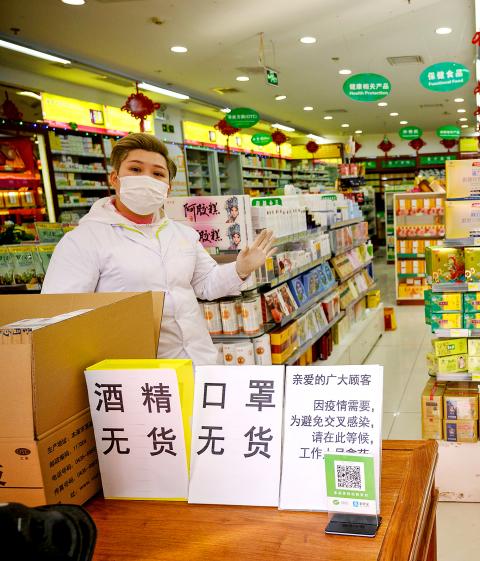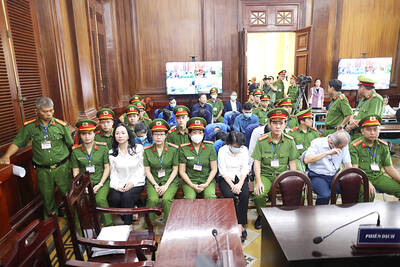A claim by Chinese scientists that a liquid made with honeysuckle and flowering plants could help fight the 2019 novel coronavirus has sparked frenzied buying of the traditional Chinese medicine, but doubts quickly emerged.
As the death toll from the coronavirus sweeping the nation continues to rise, shoppers have swamped pharmacies in search of Shuanghuanglian (雙黃連).
The rush came after Xinhua news agency on Friday last week reported that the Chinese Academy of Sciences had found the concoction “can inhibit” the virus.

Photo: AFP
Videos shared online showed long lines of people in masks lining up at night outside drug stores, purportedly in the hope of snapping up the product, despite official advice that people avoid public gatherings to prevent infection.
It quickly sold out both online and at brick-and-mortar stores, but responses to the remedy’s supposed efficacy have ranged from enthusiasm to skepticism on the Sina Weibo social media platform.
State media on Saturday sounded a more cautionary note, with broadcaster China Central Television airing an interview with Zhang Boli (張伯禮), one of the researchers leading outbreak containment efforts, who warned of the potential side effects of the medicine.
The People’s Daily newspaper said that experts advised against taking traditional remedies without professional guidance, but the claim came as Beijing looks to incorporate traditional Chinese medicine into its nationwide fight against the coronavirus.
Chinese Academy of Sciences researchers are also studying the potential use of a plant commonly known as Japanese knotweed to alleviate symptoms.
The Chinese National Health Commission on Tuesday last week said that traditional Chinese medicine practitioners were among nearly 6,000 reinforcement medical personnel being sent to Wuhan, the epicenter of the outbreak.
The strategy has reignited fierce and long-running debate about the efficacy of traditional Chinese medicine, which has a history going back 2,400 years and remains popular.
Chinese Medicine Academic Council of France member Marc Freard said that he believed traditional formulations could be used to treat people with symptoms ranging from fever to thick phlegm, but warned that many remedies on the market were of questionable quality and admitted that some medicine “lacks scientific standards of efficacy” because it relies on “individualized treatment.”
Traditional Chinese medicines were widely used in conjunction with Western methods during the 2002 and 2003 SARS epidemic, which killed 774 people worldwide.
However, a 2012 study in the Cochrane Database of Systematic Reviews found that combining Chinese and Western medicines “made no difference” in battling the disease.
The Chinese government has increasingly promoted traditional Chinese medicine abroad, often with nationalistic undertones.
Beijing issued its first white paper on traditional Chinese medicine in 2016, laying out plans to build centers and to dispatch practitioners to developing nations in Africa and Southeast Asia.
Chinese President Xi Jinping (習近平) has called it a “treasure of Chinese civilization” and said at a meeting in October last year that it should be given as much weight as other treatments.
China is “working hard to spread the message internationally about its traditional culture,” and medicine is a part of this, Freard said.
The WHO last year added traditional Chinese medicine to its “International Classification of Diseases” — a reference document for medical trends and global health statistics — after years of campaigning by Beijing, but the move was criticized by members of the scientific community, with the European Academies’ Science Advisory Council calling the decision “a major problem” because of the lack of evidence-based practice.
The WHO did not immediately respond to a request for comment.
Fang Shimin (方是民), a prominent Chinese writer known for his campaigns against academic fraud, said that he believes the Chinese government’s promotion of traditional medicine “panders to nationalism and has nothing to do with science.”
It is an enormous industry in China that was worth more than US$130 billion in 2016 — a third of the nation’s entire medical industry — Xinhua reported.

Republican US lawmakers on Friday criticized US President Joe Biden’s administration after sanctioned Chinese telecoms equipment giant Huawei unveiled a laptop this week powered by an Intel artificial intelligence (AI) chip. The US placed Huawei on a trade restriction list in 2019 for contravening Iran sanctions, part of a broader effort to hobble Beijing’s technological advances. Placement on the list means the company’s suppliers have to seek a special, difficult-to-obtain license before shipping to it. One such license, issued by then-US president Donald Trump’s administration, has allowed Intel to ship central processors to Huawei for use in laptops since 2020. China hardliners

A top Vietnamese property tycoon was on Thursday sentenced to death in one of the biggest corruption cases in history, with an estimated US$27 billion in damages. A panel of three hand-picked jurors and two judges rejected all defense arguments by Truong My Lan, chair of major developer Van Thinh Phat, who was found guilty of swindling cash from Saigon Commercial Bank (SCB) over a decade. “The defendant’s actions ... eroded people’s trust in the leadership of the [Communist] Party and state,” read the verdict at the trial in Ho Chi Minh City. After the five-week trial, 85 others were also sentenced on

‘DELUSIONAL’: Targeting the families of Hamas’ leaders would not push the group to change its position or to give up its demands for Palestinians, Ismail Haniyeh said Israeli aircraft on Wednesday killed three sons of Hamas’ top political leader in the Gaza Strip, striking high-stakes targets at a time when Israel is holding delicate ceasefire negotiations with the militant group. Hamas said four of the leader’s grandchildren were also killed. Ismail Haniyeh’s sons are among the highest-profile figures to be killed in the war so far. Israel said they were Hamas operatives, and Haniyeh accused Israel of acting in “the spirit of revenge and murder.” The deaths threatened to strain the internationally mediated ceasefire talks, which appeared to gain steam in recent days even as the sides remain far

Conjoined twins Lori and George Schappell, who pursued separate careers, interests and relationships during lives that defied medical expectations, died this month in Pennsylvania, funeral home officials said. They were 62. The twins, listed by Guinness World Records as the oldest living conjoined twins, died on April 7 at the Hospital of the University of Pennsylvania, obituaries posted by Leibensperger Funeral Homes of Hamburg said. The cause of death was not detailed. “When we were born, the doctors didn’t think we’d make 30, but we proved them wrong,” Lori said in an interview when they turned 50, the Philadelphia Inquirer reported. The